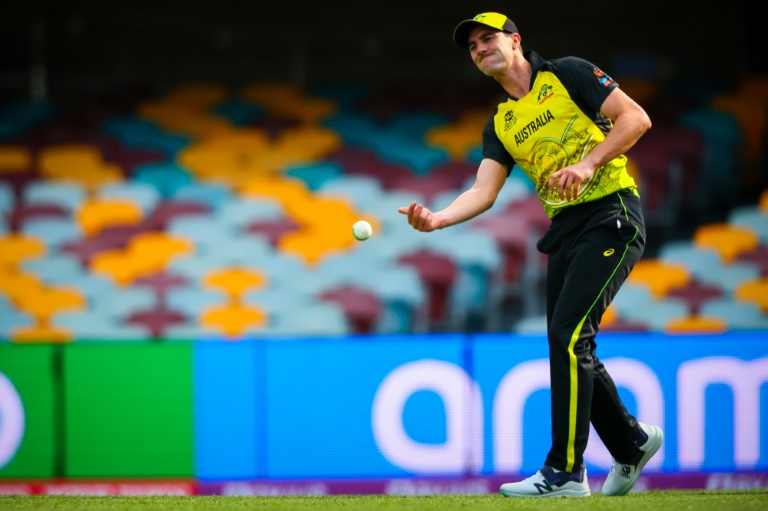Australian cricketer Pat Cummins has taken a high-profile stand
Stars from two of Australia’s favourite sporting codes are pushing back against lucrative energy and mining sponsorship deals, with cricket captain Pat Cummins leading the charge on Tuesday.
Cummins, whose role as Test captain makes him one of Australia’s most prominent public figures, told local media he would no longer appear in adverts for sponsor Alinta Energy.
The 29-year-old fast bowler is a vocal proponent of action on climate change, an urgent issue in fire, drought and flood-prone Australia.
Cricket Australia on Tuesday abruptly announced its four-year-old sponsorship deal with Alinta would end in 2023, citing a change in the firm’s “brand strategy”.
Cricket administrators denied the parting had anything to do with Cummins, despite reports of changing-room disquiet.
The player said the relationship with sponsors was “a balance”.
“We’ve seen certain players make decisions based on certain religions or certain foods, they won’t partner with specific partners,” Cummins said.
Australia’s economy is heavily dependent on coal, gas and mineral exports and the companies involved are among the country’s more profitable.
Energy and mining firms channel a small percentage of their earnings into sports from cricket to rugby and netball, sparking a clash of cultures with increasingly environmentally and culturally conscious players.
Pro-fossil fuel media commentator Chris Kelly accused Cummins of “having a whinge” and carrying out an “idiotic” protest.
– Cultural sensitivities –
This week Australia’s netball team objected to wearing jerseys with a multimillion-dollar mining sponsor on them after concerns raised by an Aboriginal player.
Hancock Prospecting, a mining company led by Australia’s richest person Gina Rinehart, this year announced an Aus$15 million (US$9 million) sponsorship with Netball Australia, which has booked losses of $7 million over the past two years.
But the sponsorship has reportedly caused turmoil inside the Australian Diamonds national team, with Aboriginal squad member Donnell Wallam raising concerns about the company’s treatment of Indigenous communities.
Her stance has reportedly been widely backed by other players.
Lang Hancock, founder of Hancock Prospecting and Rinehart’s father, suggested in 1984 dumping chemicals in water sources to sterilise Aboriginal populations that caused trouble.
Netball Australia said it was aware of “cultural sensitivities raised by a Diamonds squad member” but said it would retain the deal with Hancock.
“Netball Australia and Hancock Prospecting have been working tirelessly to acknowledge and recognise the sensitivities, to further understand the concerns of that squad member and to provide avenues for support,” the national body said in a statement.
Netball Australia chair Wendy Archer denied reports the team had boycotted uniforms with the Hancock Prospecting logo during recent games in New Zealand.
Volleyball Australia, also sponsored by Hancock Prospecting, last week said the controversy was surprising — instead praising Rinehart for her philanthropic spirit.
“Mrs Rinehart’s selfless commitment to women’s sport deserves the accolades of our great sporting nation,” it said.
Former Wallabies captain turned senator David Pocock has voiced his objection to Santos energy’s sponsorship of the national rugby team he once led.
“I was always proud to represent my country. As a rugby player, that’s what you dream of. It’s been difficult to watch a partnership emerge with Santos,” Pocock recently told local media.
“I really think fossil-fuel sponsorship is the new cigarette sponsorship, where they are advertising a product that we now know is destroying our home planet and our futures.”









